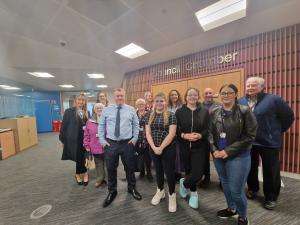Care experienced 10x more likely to be NEETs by age 20

Published by Professional Social Work magazine - 4 April, 2023
Care leavers are ten times more likely not to be working or studying by the age of 20 than their non-care experienced peers, a study has found.
Nearly one-third (28.6 per cent) were found to be not in education, employment or training (NEETs) compared to just 2.4 per cent of their age group in England.
Mental health issues and caring responsibilities such as being a parent were found to be key barriers, as well as lower levels of qualifications making it hard to find work “in a competitive and highly-credentialised labour market”, the study said.
Researchers said care leavers were also “not able to benefit from family and other social networks that otherwise help young people to identify appropriate work and study opportunities”.
Lead researcher Dr Neil Harrison, of the University of Exeter, said: “This is the first study of its kind to explore over time what happens to care leavers and other care-experienced young people in early adulthood. We have been able to document the acute challenges they face in making positive transitions towards stability and wellbeing.
“What we clearly see in the data is that the legacy of earlier disadvantages, such as childhood trauma or disruptions to schooling, gets cemented in early adulthood. While around a quarter of care leavers were able to access higher education or stable work by their 21st year, the majority were reliant on benefits or precarious employment. Urgent action is needed to remedy this.”
The research shows a strong link between economic inactivity and higher levels of special educational needs during Key Stage 4, including attending a special school. More than six out of ten care leavers (62.4 per cent) were identified as having a high level of need.
Care leavers highlighted barriers accessing youth employment schemes like Kickstart.
Among recommendations from the study were:
- Providing strong routes for young people to go into (and back into) post-16 education and training
- National government should provide additional ‘top up’ funding for care leavers to participate in apprenticeships and other schemes
- Young people leaving care between 14 and 16 should be considered as an ‘at risk’ group with respect to complex transitions into adulthood
- Stronger links with local employers to improve young people’s knowledge of opportunities
- Targeted pre-employment and pre-apprenticeship support
- Education providers and employers should have greater awareness of trauma and mental health needs for care leavers and other care-experienced young people
Care experienced people have increasingly campaigned for better treatment and rights in recent years.
England’s Independent Review of Children’s Social Care called on the government to make care experience the tenth protected characteristic under the Equality Act.
The government, however, rejected this, maintaining that it would add to stigma.
Growing numbers of local authorities across the UK have responded to campaigners by making care experience a protected characteristic within their policies.
Doncaster became the 13th authority to do so earlier this year.
Terry Galloway, who is leading the campaign, said: “I really hope this will spur other groups across these islands to bring more motions so that we can finally get the change we need and deserve.”
